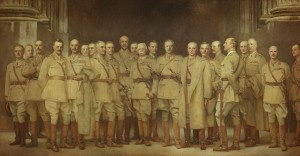
Whatever happened to Glebelands House in Wokingham? Click here
One of the lesser known stories of the changes which took place in Britain during the 20th century, was the widespread destruction of the Stately Home. Joshua Allerton in his second article, explains how the reigns of power changed hands and why.
The First World War prompted the change in power and wealth. By the eve of the Second World War, the percentage of all wealth owned by the top one per cent was 55, compared to the 69 per cent in 1913 (Stevenson, 1984). Analysing the shift closely, it is fair to argue that the change wasn’t an impact, as in 1937, the top five per cent “owned 79 per cent of all wealth” in Britain. (Stevenson, 1984) Whilst this is fair, the time for a shift to completely take place must be considered. It is not an overnight job and it would be foolhardy to expect the wealthy to walk amongst the streets throwing money everywhere. What is shown is the start of the rolling ball, as by 1955 – with the influence of the Second World War being another debate – the percent of all wealth owned by the top one per cent was 42.
On the opposite end of the scale, in the working classes, there is evidence to suggest that the shift had affected them. On the eve of the Second World War, over 33 per cent of all adults left some property, which is double the figure in 1901. The bulk of this gain was in “small estates worth up to £500” hinting that the lower classes were starting to see the “growing importance of house-ownership” and savings. (Stevenson, 1984)
Whilst the wealth was shifting, the way in which wealth was accumulated changed as well. Before the war, the diminishing of the gentry was well under way. With the Third Reform Act, the creation of local elected authorities and the agricultural depression, the gentry were barely breaking even. The final blow was the death duties that came as a result of the war. With at least “64 percent of [them] holding the rank of Major-General and above” (Robbins, 2004), every time an officer died, the tax was payable by all except the spouse of the deceased. This forced many of the gentry’s families to sell up in order to pay the tax. As they lost land, they lost the political power their houses used to give them.
As the gentry fell, smaller merchants and manufacturers rose. After 1918, “estates worth more than £100’000 [which was often where these smaller businesses were] increased at a much faster rate… than in the Edwardian era.” (Stevenson, 1984) Most of the affected businesses were in the food industry. Their success came about because of the lack of food available. Within two years of the war, Britain was left with just six weeks’ supplies of food, forcing them into rationing in 1917. With food becoming scarce due to the amount of farm workers at war and also because of the German’s U-Boat campaign, this made the price to rise. In 1916, the price had risen 61 per cent compared to figures in 1914. With high demand and a low source, price rose, filling the pockets of the industrialists. Just like with the gentry, with money came power.
There is an obvious change between wealth and power and the First World War can be held responsible. The gentry may have been falling beforehand, but without the war, they had a chance to survive. Coming out of the depression meant things could only go up. However, the war caused many deaths within the gentry and tax to be paid. The war also caused the scarce food supply and the price increase that went with it, causing many food industrialists to accumulate wealth. As a result, it is fair to say that the First World War changed society in terms of wealth and power.
Joshua Allerton is a freelance writer who in his spare time expresses his passion for history, whether through the traditional role of a historian or his Viking re-enactment. Constantly researching, he will be attending university in September to further his knowledge in the field.
If you are a publisher and would like to support Joshua’s works, please contact him on: jtallerton@gmail.com


